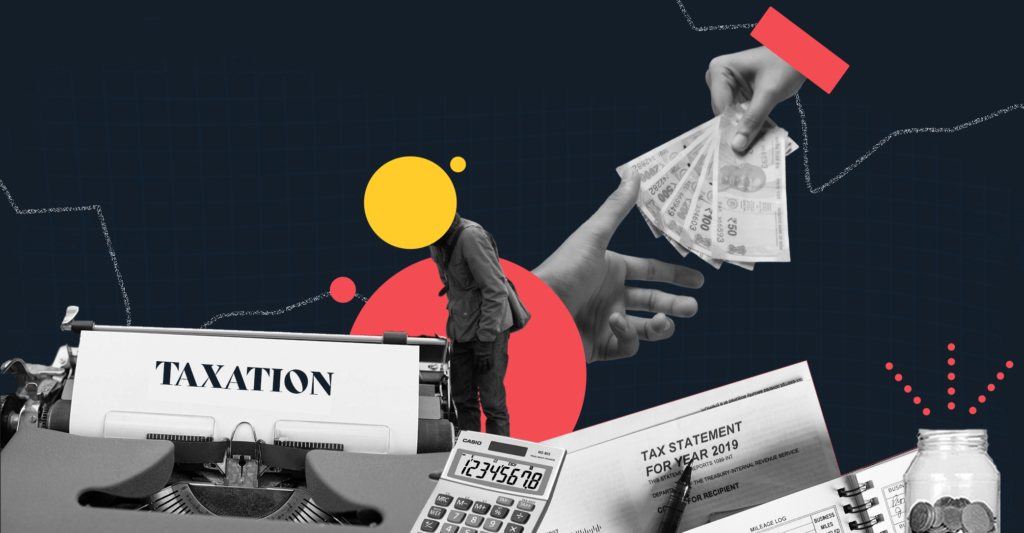Last Updated on Jan 16, 2023 by Anjali Chourasiya
Securities Transaction Tax (STT) is a direct tax levied on profits from financial instruments like equities, futures and options or the purchase/sale of any securities listed on the stock market exchange. Former Finance Minister P. Chidambaram introduced the STT in 2004 as a measure to counter tax evasion by market participants. What are STT charges, and what is the STT total that you are charged when you buy or sell your stocks? This article explores that and much more.
Table of Contents
What is Securities Transaction Tax?
The Securities Transaction Tax is a direct tax levied by the Central Government and enforced by the Securities Transaction Tax Act. STT is not charged on unlisted shares unless these shares are sold under an OFS (Offer for sale). It is vital to consider that off-market transactions do not come under the scope of the STT Act. This means STT is only applicable if transactions are done on registered Indian stock exchanges.
In the case of STT charged on Futures & Options transactions, the tax on future trade amount is calculated on the actual trading price. In contrast, option trades are taxed at premium amounts. This amount is collected at the time of a transaction by the broker.
STT is deposited by the brokers on the 7th of every month for the succeeding month, where profits are earned. Stock exchanges and mutual fund houses have to file annual returns for the financial year ending, in which STT has been reduced or collected. Failure to file annual returns can lead to heavy penalties and fines.
Scope of the term ‘securities’ liable for STT
Since there is no specific definition of securities under the STT Act, what comes under securities has been taken from the Securities Contracts (Regulation) Act, 1956 and the Income Tax Act, 1961. This includes –
- Shares, scrips, stocks, bonds, debentures, and other marketable securities of a similar nature that incorporated companies issue or other bodies corporate
- Derivatives
- Units or other instruments issued by collective investment schemes to investors
- Government securities that have an equity component
- Equity-oriented units of mutual funds
- Rights or interests in securities
- Securitised debt instruments
STT is not applicable for off-market transactions on commodity and currency transactions. It is also not applicable to Gold ETFs, Liquid/Gilt ETFs, and International ETFs.
Features of STT
Securities Transactions Tax (STT) is a method of efficiently collecting taxes from the financial market and has certain distinct characteristics. The key features of STT include the following:
- It is only levied on sell transactions of options and futures.
- It is only applicable to transactions made on recognised stock exchanges, and the clearing member is responsible for paying the total STT taxes of the trading members under him.
- STT on futures is based on the actual traded price, whereas for options, it is calculated based on the premium traded value.
- Tax rates for STT vary depending on the type of security and the nature of the transaction (sales or purchases).
- The Central Government of India is responsible for determining the STT tax rates.
How is STT calculated?
STT is always calculated on the Average Price. To calculate the Average Price, use the below-mentioned formula:
Average Price = (Buy Quantity*Buy Price) + (Sell Quantity*Sell Price) / (Buy Quantity+Sell Quantity).
The following are the taxable security transactions:
| Sr. no. | Taxable security transaction | Tax rate | PAYABLE BY |
| 1 | Purchase of an equity share in a company, where such contract is settled by the actual delivery or transfer of such share or unit. | 0.100% | Purchaser- on the value of taxable securities transaction based on the volume weighted average price. |
| Purchase of a unit of an equity-oriented fund, where such contract is settled by the actual delivery or transfer of such share or unit. | NIL | NA | |
| 2 | Sale of an equity share in a company, where such contract is settled by the actual delivery or transfer of such share or unit | 0.100% | Seller – on the value of taxable securities transaction based on the volume weighted average price. |
| Sale of a unit of an equity-oriented fund, where such contract is settled by the actual delivery or transfer of such share or unit | 0.001% | Seller – on the value of taxable securities transaction based on the volume weighted average price. | |
| 3 | Sale of an equity share in a company or a unit of an equity-oriented fund, where such contract is settled otherwise than by the actual delivery or transfer of such share or unit. | 0.025% | Seller – on the value of taxable securities transaction based on the volume weighted average price. |
| 4a | Sale of an option in securities | 0.05% | Seller – on the option premium. |
| 4b | Sale of an option in securities, where the option is exercised | 0.125% | Purchaser – on the settlement price. |
| 4c | Sale of a future in securities | 0.010% | Seller – on the price at which such futures are traded. |
Source: NSE India
Levy of STT
Cash market
STT is charged at 0.025% when stocks are sold in the cash segment for intraday trades. It is calculated by multiplying the rate by the selling price and the number of shares.
For instance, assume 10 shares of XYZ company are sold at Rs. 500 per share at 3:15 pm; then STT would be 500 x 10 x 0.025% = Rs. 1.25. There is no STT while purchasing equity for intraday purposes.
STT on delivery trades is levied on both the buy and sell sides of the transaction. For example, if 10 shares are purchased at Rs. 200 per share, then STT will be charged at 0.1%, which will be calculated as 10 x 200 x 0.1% = Rs. 2.
On the sell side, if these shares are sold at Rs. 250, STT will be charged at 0.1%, which will be calculated as 10 x 250 x 0.1% = Rs. 2.5. Hence, the total STT paid on this transaction = Rs. 2 (buy) + Rs. 2.5 (sell) = Rs. 4.5. STT on the delivery-based sale of a unit of an oriented mutual funds transaction is levied at a rate of 0.001%.
Futures & Options
For transactions involving options selling, STT is charged at a rate of 0.017% on the options premium. If the option is exercised, then this rate is set at 0.125% on the settlement price. It is important to note that when the option is exercised, STT is paid by the purchaser.
For future transactions, STT is levied at the rate of 0.01%. The seller is responsible for paying this amount, and it is charged at the price at which the future is being traded on the market.
Relation between Income Tax and STT
Treatment of STT depends on income being categorised under the ‘Income from Capital Gains’ or ‘Profits and Gains of Business and Profession’. A person will only be taxed under Income from Capital Gains if he is either in some other line of business or is a salaried employee.
If the holding period is less than one year, then such income comes under STCG, whereas if the holding period is more than one year, then such income is taxed under LTCG. Equity shares that are sold on NSE or BSE will be taxed at 10% if it is subject to LTCG tax. This rate increases to 15% if it is a short-term transaction. In addition to this, a surcharge and education cess will also be levied.
When the assessee’s primary source of income is through trading in securities, then the assessee will fall under the head ‘Profits and Gains of Business and Profession’. In such a case, capital gains are taxed as per the regular income tax rate, and any amount of STT paid is allowed to be deducted as a business expense under Section 36 of the Income Tax Act.
To conclude
It is clear that the Securities Transaction Tax is a straightforward and easy-to-understand way of taxing stock market transactions. The purpose of introducing the STT was to ensure the establishment of a system that would prevent tax evasion and promote transparency. The Finance Act, STT Act and Income Tax Act have provided the framework for this system, ensuring that investors and traders do not lose out on their profits entirely while they are taxed.
FAQs
What is securities transaction tax (STT)?
Securities Transaction Tax (STT) is a tax imposed by the Indian Government on the value of securities (shares, bonds, debentures, etc.) traded on the stock exchanges in India. It is a direct tax that is levied on the sale and purchase of securities.
How is STT calculated on stock market transactions?
STT is calculated as a percentage of the value of the transaction and is different for different types of securities and transactions. For example, the STT on the sale of equity shares is 0.1% of the transaction value, while for options trading, it is 0.05% of the option premium.
Are there any exemptions or reductions available for STT?
There are no exemptions available for STT, but the Government has announced some reductions of the STT on certain transactions like the long-term capital gains (LTCG) tax announced in the budget of 2018, where LTCG of up to 1 Lakh is exempt from STT.
Are there any differences in STT for different types of securities, such as equity vs derivatives?
Yes, there are differences in the STT for different types of securities.
For example, the STT on the sale of equity shares is 0.1% of the transaction value, while for options trading, it is 0.05% of the option premium. The STT rate for derivatives also differs from the rate for equity shares.
Is Securities Transaction Tax a direct tax?
Yes, STT is a direct tax collected by the Central Government of India and is directly imposed during the transaction of equities in the stock market.
When is Securities Transaction Tax not applicable?
STT is not applied to off-market transactions, and buyers do not have to pay the tax when purchasing an equity-oriented mutual fund.
- How To Withdraw Mutual Funds? - Jun 6, 2025
- Top Maternity Insurance With Low Waiting Periods - Jun 5, 2025
- ROE vs ROCE – What are the Differences? - Jun 5, 2025





